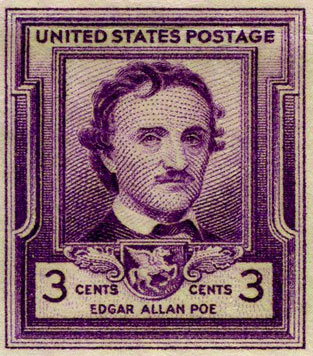 |
Edgar Allan Poe |
Edgar Poe was born on January 19, 1809, in Boston, Massachusetts. His parents David and Elizabeth were actors. Edgar was one of three children. Poe’s father deserted the family when Edgar was very young. In 1811, his mother died and the children became orphans. The three siblings were separated and went to live with different families. Edgar went to Richmond, Virginia, to live with John and Francis Allan. This is how Edgar got the middle name “Allan.” The Allans were wealthy and sent him to private school. During his teenage years, however, Edgar frequently argued with his surrogate father about his future. Furthermore, Edgar developed a troubling gambling habit and found himself in serious debt. John disapproved of Edgar’s dreams of becoming a writer and refused to help him pay his debt, so Edgar left the house to live on his own and enlisted in the U.S. Army for a five-year term. He served under the name Edgar A. Perry.
In 1827, he published a forty-page booklet called Tamerlane and Other Poems, which ultimately proved a failure. In January 1829, Edgar rose to the rank of sergeant major, but decided he wanted to resign his commission. Because he had enlisted for five years, however, leaving the military became complicated. Edgar learned from a another officer he could resign his commission if he mended relations with John Allan and entered the United States Military Academy at West Point. Poe agreed and Allan supported his plan to attend the Academy. During this time, Edgar’s Al Araaf, Tamerlane and Minor Poems was published in Baltimore, Maryland. The book was given a good review by the novelist and critic John Neal.
In 1830, Poe and Allan experienced a falling out and Allan dismissed him from the family, resulting in Edgar leaving West Point and moving to live with an aunt in Baltimore. In 1831, he published Poems by Edgar Allan Poe and began to submit short stories to magazines. In 1833, Edgar received a prize for his work entitled "Ms. Found in a Bottle," and a friend got him a job working for the Southern Literary Messenger. He soon became well known for his work with the magazine.
In late 1830s, Poe published a collection of stories called Tales of the Grotesque and Arabesque. It included some of his most frightening works such as "The Fall of the House of Usher," "Ligeia" and "William Wilson."
Later, Poe married his 13 year-old cousin, Virginia, and moved to Richmond. In 1837, he stopped working at the magazine and moved to New York City, then to Philadelphia. He started working as coeditor of Burton's Gentleman's Magazine. In two years, he helped increase its circulation from five thousand to twenty thousand. Much of his best work was featured in the magazine, including "The Fall of the House of Usher." In 1841, Poe started a new genre of detective fiction with "The Murders in the Rue Morgue."
Poe won a literary prize in 1843 for "The Gold Bug," a tale of secret codes and hunting treasure. He also published a short story called The Tell-Tale Heart. It was originally printed in Boston, Massachusetts in a journal called The Pioneer. The Gothic fiction work was a terrifying story of the murder of an old man by his caretaker. In the story, the narrator tells of being haunted by the old man’s “vulture eye,” and kills him to be rid of it. The narrator tries to convince the reader that it was his acute senses rather than insanity that drove him to murder.
In 1845, Edgar’s famous poem "The Raven" was published, arguably the most famous poem in American history. The dark, lyrical, supernatural poem that features the timeless words “Once upon a midnight dreary, as I pondered weak and weary…” was instantly a classic hit and made Poe an internationally recognized master of poetry. The poem features themes of loss, loneliness, and death. The raven itself reinforces the themes throughout the poem as it torments the subject into a descent into madness.
| The Raven - narrated by James Earl Jones (the voice of Darth Vader) |
In 1847, Poe’s wife became ill with tuberculosis and died. Edgar was devastated by the loss of his wife and started abusing alcohol. His depression intensified over the next few years. On October 3, 1849, Poe was found delirious on the streets of Baltimore, wearing the clothes of another person. He died four days later. The actual cause of death was never determined, though acute alcohol poisoning, meningitis, or even rabies, were thought to be possible causes of death.
 |
Edgar Allan Poe is one of the most influential authors in American history. He is credited with popularizing the short story and is often considered the first, or, one of the first, science-fiction authors. His homes in New York City and Baltimore are now museums. The National Football League Baltimore Ravens are named for Poe's trademark poem The Raven.
Works Cited
"American National Biography Online: Poe, Edgar Allan." American National Biography Online: Poe, Edgar Allan. N.p., n.d. Web. 24 May 2016. <https://www.anb.org/articles/16/16-01302.html>.
"Edgar Allan Poe Biography." - Life, Family, Children, Name, Story, Death, Wife, Mother, Son. N.p., n.d. Web. 24 May 2016. <https://www.notablebiographies.com/Pe-Pu/Poe-Edgar-Allan.html>.
"Edgar Allan Poe." Bio.com. A&E Networks Television, n.d. Web. 26 May 2016. <https://www.biography.com/people/edgar-allan-poe-9443160#major-works>.
"The Tell Tale Heart - A Story of Memorable Fiction." The Tell Tale Heart - A Story of Memorable Fiction. N.p., n.d. Web. 26 May 2016. <https://www.poe200th.com/the-tell-tale-heart---a-story-of-memorable-fiction/>.